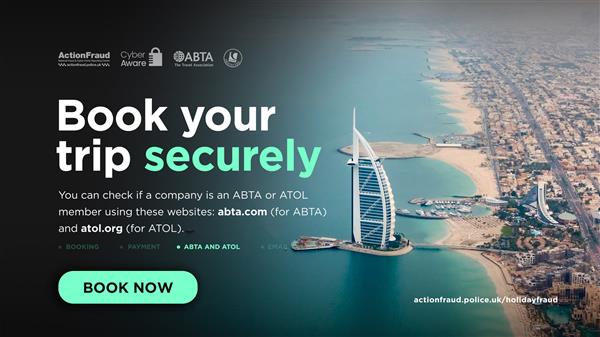|
||||
|
||||
|
|
||||
|
February is the month of the year when people begin to think about booking their summer holidays and most of us look forward to an annual holiday or short break which, often, we find and book online.But fraudsters also love the internet. They use fake websites, listings, emails, advertisements, social media posts and texts – and also phone calls – to trick you into paying for a holiday that doesn’t exist.
To help save you from losing your holiday and your money, the Police and Crime Commissioner for North Wales has teamed up with Get Safe Online to put together some expert tips on safely searching and booking holidays and travel with confidence. Get Safe Online is a leading source of unbiased, factual and easy-to-understand information on online safety in the UK. “Cybercriminals will be looking to take advantage of this by creating fake websites, listings, e-mails, adverts, social media posts or text messages promoting fake ‘great deals’. Some victims don’t even realise that they’ve been scammed until they arrive at their holiday destination. “But it’s important for people to be vigilant of the dangers posed by fraudsters on the internet and to take a few moments to follow advice and look into the deal they are presented with. There may well be no concerns at all, but it’s better to be cautious than be caught out.” As well as thoroughly researching your package holiday, flight, accommodation, cruise, pilgrimage or other break/travel to make sure it’s authentic before you book, here are some other golden pieces of advice to consider:
Mis Chwefror ydy'r mis yn y flwyddyn pan mae pobl yn dechrau meddwl am archebu eu gwyliau haf. Mae'r rhan fwyaf ohonon ni'n edrych ymlaen at wyliau blynyddol neu seibiant bach. 'Da ni'n aml yn dod ar eu traws ac yn eu harchebu nhw ar-lein. Ond mae twyllwyr yn hoff o'r rhyngrwyd hefyd. Maen nhw'n defnyddio gwefannau, rhestrau, negeseuon e-bost, hysbysebion, cyhoeddiadau ar y cyfryngau cymdeithasol, negeseuon testun a galwadau ffôn ffug er mwyn eich twyllo chi dalu am wyliau sydd ddim yn bodoli.
Er mwyn helpu eich achub chi rhag colli eich gwyliau a'ch pres, mae Comisiynydd Heddlu a Throsedd Gogledd Cymru wedi ymuno hefo Get Safe Online er mwyn rhoi cynghorion arbenigol at ei gilydd ar chwilio am ac archebu gwyliau'n saff a theithio'n hyderus. Mae Get Safe Online yn brif ffynhonnell gwybodaeth deg, ffeithiol a hygyrch ar ddiogelwch ar-lein yn y DU.
Dywedodd PC Dewi Owen o Dîm Troseddau Seiber Heddlu Gogledd Cymru: “Gyda chostau byw yn grocbris, efallai fod pobl ar draws Gogledd Cymru yn meddwl sut y gallan nhw arbed pres ar eu gwyliau nesaf. Bydd troseddwyr seiber yn chwilio am fanteisio ar hyn drwy greu gwefannau, rhestrau, negeseuon e-bost, hysbysebion, cyhoeddiadau ar y cyfryngau cymdeithasol neu negeseuon testun ffug yn hyrwyddo ‘bargeinion gwych’ ffug. Dydy rhai dioddefwyr ddim yn sylweddoli eu bod nhw wedi’u twyll tan iddyn nhw gyrraedd eu cyrchfan wyliau hyd yn oed.
“Hefo 6,457 o bobl yn riportio eu bod nhw wedi dioddef twyll gwyliau yn y DU rhwng mis Ebrill 2022 a mis Mawrth 2023 yn ôl Action Fraud, gan arwain at golledion o £15.3m, peidiwch â gadael i wyliau eich breuddwydion fod yn hunllef. Dilynwch y cyngor a’r canllawiau er mwyn gwneud yn siŵr nad ydy’r twyllwr yn mynd ar wyliau hefo’ch pres chi.”
Dywedodd Andy Dunbobbin, Comisiynydd Heddlu a Throsedd Gogledd Cymru: "Mae pawb yn edrych ymlaen at eu gwyliau haf. Rŵan hyn, tra mae'r tywydd yn oer a llwyd yn y DU, ydy'r amser mae llawer o bobl yng Ngogledd Cymru yn dechrau breuddwydio a chynllunio am gyfnodau cynhesach. Ond mae'n bwysig i bobl fod yn wyliadwrus am beryglon twyllwyr ar y rhyngrwyd a chymryd ychydig funudau er mwyn dilyn cyngor ac ymchwilio'r fargen maen nhw'n ei gweld. Efallai na fydd pryderon o gwbl, ond mae'n well bod yn wyliadwrus na chael eich dal."
Dywedodd Tony Neate, Prif Swyddog Gweithredol Get Safe Online: "Wrth i gostau byw barhau bod yn uchel, 'da ni eisiau helpu gwarchod pres pobl Gogledd Cymru sydd wedi'i ennill drwy waith caled. 'Da ni'n annog pobl fod yn wyliadwrus wrth archebu gwyliau. Dilynwch eich greddf a chofiwch, os ydy bargen yn edrych yn rhy dda i fod yn wir, mae'n debygol nad ydyw."
Awgrymiadau i'w cadw mewn cof wrth archebu
Ynghyd ag ymchwilio eich gwyliau parod, hediadau, llety, mordaith, pererindod neu seibiant/teithio arall yn drwyadl er mwyn gwneud yn siwr ei fod yn ddilys cyn archebu, dyma gyngor euraidd i'w hystyried:
· Byddwch yn ymwybodol o wyliau/hediadau anarferol o rad neu flaendaliadau mawr. · Gwiriwch fod y llety'n bodoli drwy chwilio amdano ar Google Maps a chwiliwch am adolygiadau ac argymhellion annibynnol. Gwnewch yn siŵr fod rhif ffôn a ffoniwch y perchennog/asiant yn uniongyrchol er mwyn cadarnhau os ydy'r un 'da chi'n archebu'r gwyliau hefo nhw hefo awdurdod gwerthu'r gwyliau i chi. Os na roddir y rhif, e-bostiwch a gofynnwch amdano. Holwch gwestiynau er mwyn gweld os oes ganddyn nhw wybodaeth am yr ardal. · Gwiriwch adolygiadau ar Trip Advisor a gwefannau tebyg. · Os 'da chi'n archebu llety drwy Airbnb, cadwch y negeseuon a'r taliad ar lwyfan Airbnb. Peidiwch â chael eich temtio i adael y llwyfan gan y gall hwn fod yn ffordd o geisio'ch twyllo. Darllenwch gyngor diogelwch Airbnb i westeion. · Peidiwch byth â thalu trosglwyddiad banc i gwmni neu rywun dydych chi erioed wedi cael profiad personol o brynu gaddynt o'r blaen. Os ydy o'n dwyll, efallai na chewch eich pres fyth yn ôl. Mae talu drwy gerdyn credyd yn golygu mwy o siawns o gael eich pres yn ôl os ydy rhywbeth yn mynd o chwith. · Gwiriwch fod cwmnïau gwyliau a threfnwyr teithiau 'da chi'n archebu gwyliau ac yn teithio hefo nhw'n aelodau o gymdeithasau masnachu fel ABTA neu ATOL, drwy wirio gwefannau'r cyrff hyn. · Rhowch gyfeiriad y wefan 'da chi'n cynllunio archebu gwyliau hefo nhw, ar www.getsafeonline.org/checkawebsite er mwyn gwirio os ydy o'n debygol o fod yn gyfreithlon neu'n dwyllodrus. · Gwiriwch delerau ac amodau cyn talu. · Cyn talu ar-lein neu roi unrhyw fanylion cyfrinachol, teipiwch gyfeiriad y wefan 'da chi'n wybod sy'n gywir (yn hytrach na dilyn dolen). Gwnewch yn siŵr fod y dudalen talu yn saff (yn dechrau hefo 'https' a hefo clo clap wedi cloi yn ffrâm ffenest y porwr). · Cadwch negeseuon cadarnhau a derbynebau, a gwiriwch ddatganiadau cardiau banc/credyd am gofnodion afreolaidd.
Mae Heddlu Gogledd Cymru yn cynghori os 'da chi'n meddwl eich bod chi wedi dioddef twyll gwyliau, riportiwch wrth eich banc yn y lle cyntaf ac yna ActionFraud ar www.actionfraud.police.uk neu 0300 123 2040.
Am fwy o gyngor am ddim ac ymarferol ar gadw'n saff ar-lein, ewch ar www.getsafeonline.org
| ||||
Reply to this message | ||||
|
||||
|
|
Accessibility | Font Size A A A Cymraeg











